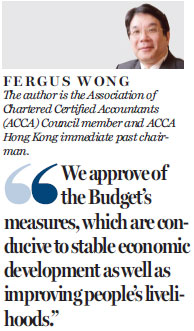Budget measures will improve Hong Kong people's livelihoods
Updated: 2016-02-29 08:39
By Fergus Wong(HK Edition)
|
|||||||||
Financial Secretary John Tsang Chun-wah unveiled the government's Budget for 2016-17 on Wednesday. ACCA (the Association of Chartered Certified Accountants) Hong Kong welcomes the initiatives outlined by the government. These are basically in line with our earlier recommendations. These included enhancing the business environment and improving people's livelihoods against the backdrop of a difficult global economic environment.
The Budget introduces a series of one-off tax relief measures. These included reducing salaries tax, tax under personal assessment and profits tax, waiving rates, and providing an extra one-month payment of Comprehensive Social Security Assistance, Old-Age Allowance, Old-Age Living Allowance or old age Disability Allowance. These measures are laudable as they will help lessen the economic burden on the public and improve people's livelihoods, while promoting sustainable economic development.
The government should also be complimented for introducing concrete relief measures for small- and medium-sized enterprises (SMEs). SMEs have long been a pillar of Hong Kong's economic growth. The measures announced by the Tsang demonstrate the government's commitment to support the development of SMEs. We also suggest the government should offer profits' tax incentives to SMEs - within a limited time frame. This is to further support the business sector.
The government has forecast a fiscal surplus of HK$30 billion (after deducting HK$45 billion earmarked for the Housing Reserve) for the current fiscal year which ends in March. Hong Kong's fiscal reserves will hit HK$860 billion by the end of March. For the next fiscal year, the government forecasts public expenditure will increase to 21.2 percent of local GDP. This is slightly above the healthy level of 18-20 percent over the past two years (20.4 percent in 2015/16). The potential issue of a structural deficit is worthy of attention. We urge the government to carry out a thorough review of various expenditures and examine the feasibility of different proposals to control public expenditure and maintain a fiscal balance.
The government has over recent years promoted the development of the innovation and technology sector. This will provide new impetus for Hong Kong's economic future. We are pleased to see that the government has reserved HK$500 million for the three-year Pilot Technology Voucher Programme, subsidizing SMEs to use technology services and solutions, which is in line with ACCA's continued advocacy of subsidising innovative projects.
As mentioned in our budget proposal, we believe the Innovation and Technology Bureau would play a significant role in identifying eligible companies for a "super tax reduction" for qualified research and development expenditure, and developing criteria regarding cash rebates for designated expenditure incurred by businesses in the sector. These measures would support the long-term healthy growth of the industry.
The government should also seize the opportunities associated with the nation's "Belt and Road" strategic initiative and boost economic development through various measures, including expanding its tax treaty network with other countries; streamlining the implementation of tax agreements; and offering tax incentives to encourage the establishment of regional headquarters or service centers in Hong Kong.
We also recommended tax incentives for middle-income families to alleviate their financial pressure against an inflationary backdrop. We support the series of one-off relief measures introduced in the Budget. We are pleased to see the government will adjust allowances under salaries tax and personal assessment and raise the dependent parent/grandparent allowance.
With anticipated problems arising from a growing aging population. We also agree with the government's proposal to issue Silver Bonds this year and next, targeting Hong Kong residents aged 65 or above. This is necessary to provide them with a stable source of returns. We also urge the government to take further concrete and effective measures at different levels to combat the problems stemming from the issue, which include increasing pressure on the city's healthcare and welfare systems. We also recommend deducting private medical insurance premiums from salaries tax to encourage the public to prepare for their own medical plan as soon as possible, as an early move to prepare for future expenditure on medical care.
Overall, we approve of the Budget's measures, which are conducive to stable economic development as well as improving people's livelihoods. Yet the government's future financial position remains our biggest concern. We want to see more sustainable and effective measures from the authorities. A comprehensive review of the city's tax system in the longer-term is also recommended. This would improve the competitiveness of the local business environment. It will also ensure good economic prospects and a better standard of living in the long term.

(HK Edition 02/29/2016 page10)